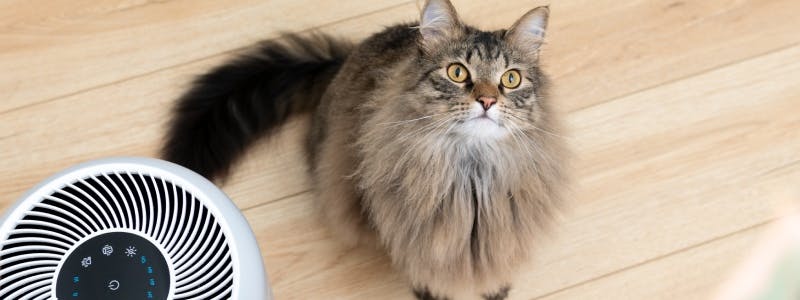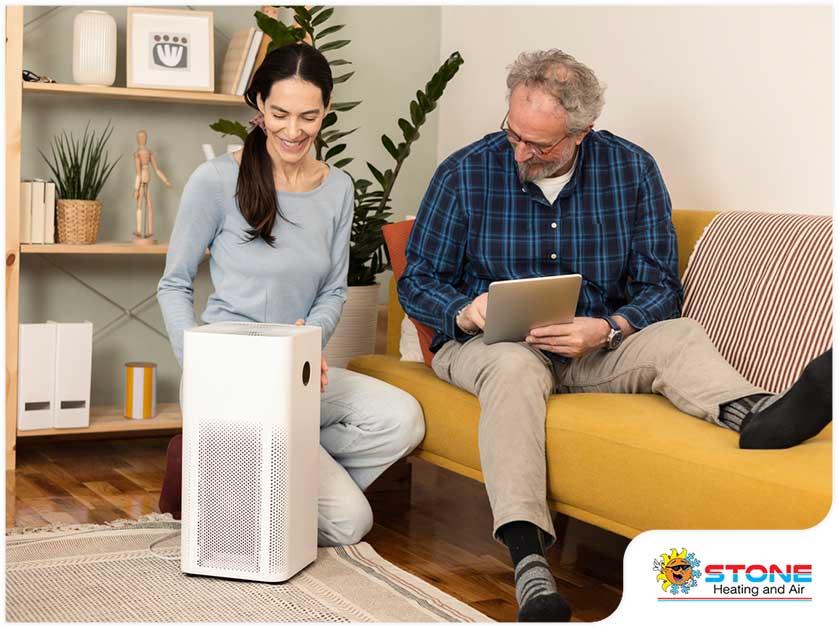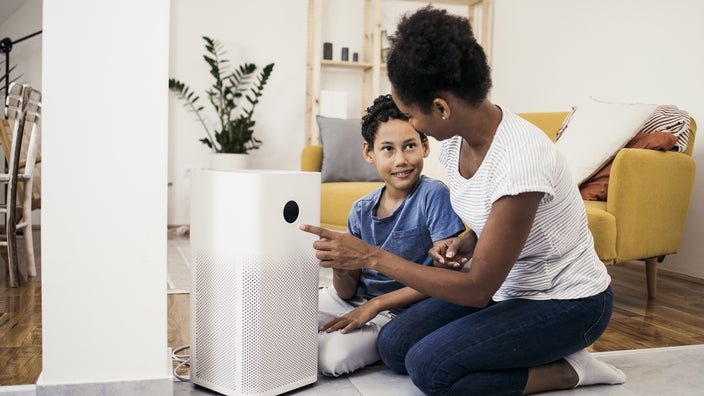Yes, air purifiers can help with seasonal allergies. They filter out pollen, dust, and other allergens.
This reduces symptoms and improves air quality at home. Seasonal allergies can be a nightmare. Sneezing, itchy eyes, and runny noses make life miserable. Many people seek relief through various methods. One effective solution is using air purifiers. These devices can capture tiny particles in the air.
They remove allergens like pollen, pet dander, and dust mites. This can make a big difference for allergy sufferers. Clean air can mean fewer symptoms and better health. In this blog, we will explore how air purifiers work and their benefits. You’ll learn how they can help you breathe easier during allergy season.
Introduction To Air Purifiers
Seasonal allergies can be a real nuisance. They cause discomfort and disrupt daily life. Air purifiers offer a solution. They improve indoor air quality. This can bring relief to allergy sufferers. But what exactly are air purifiers? And how do they work? Let’s explore.
What Are Air Purifiers?
Air purifiers are devices designed to remove contaminants from the air. They can help with dust, pollen, and pet dander. This makes the air cleaner and easier to breathe. Many people use them at home or at work. They are especially useful during allergy season.
How They Work
Air purifiers work by filtering out particles. They use different methods to do this. Here are some common types:
- HEPA Filters: Trap large particles like dust and pollen.
- Activated Carbon Filters: Remove odors and gases.
- UV Light Purifiers: Kill bacteria and viruses.
- Ionizers: Charge particles so they stick to surfaces.
Each type has its own benefits. Combining them can be more effective. Choosing the right purifier depends on your needs.
Air purifiers can make a significant difference. They create a cleaner, healthier environment. This is important for people with allergies. Cleaner air can lead to fewer symptoms. It can improve overall well-being.

Credit: www.eroftexas.com
Seasonal Allergies Overview
Seasonal allergies affect millions of people worldwide. They occur at specific times of the year when allergens are most prevalent in the air. Many people suffer from symptoms that can disrupt daily life. Understanding the triggers and symptoms of seasonal allergies can help manage them effectively.
Common Triggers
Several common triggers can cause seasonal allergies. These include:
- Pollen: Trees, grasses, and weeds release pollen into the air.
- Mold spores: Mold grows in damp areas and releases spores.
- Dust mites: Tiny creatures that live in house dust.
- Animal dander: Flakes of skin from pets such as cats and dogs.
Each trigger can vary in intensity depending on the season and location.
Symptoms And Effects
Seasonal allergies can cause various symptoms. Here are some of the most common:
- Sneezing: A frequent and sudden expulsion of air from the nose.
- Runny or stuffy nose: Excess mucus production causing nasal congestion.
- Itchy eyes and throat: Irritation and discomfort in the eyes and throat.
- Watery eyes: Excess tear production leading to watery eyes.
These symptoms can affect daily activities and overall well-being. In some cases, they can lead to more serious conditions like sinus infections or asthma attacks.
Air purifiers can be a helpful solution for managing these symptoms. They work by filtering out allergens from the air, providing relief to allergy sufferers.
Air Purifiers And Allergy Relief
Air purifiers help reduce pollen and dust in the air, easing seasonal allergy symptoms. Cleaner air leads to fewer sneezes and less congestion. Enjoy improved indoor air quality with fewer allergens.
Air purifiers can greatly help with seasonal allergies. These devices clean the air by removing allergens. Many people find relief from their symptoms by using air purifiers.Reducing Pollen
Pollen is a common trigger for seasonal allergies. It enters homes through open windows and doors. Air purifiers can capture and remove pollen from the air. This helps reduce exposure and eases allergy symptoms.Eliminating Dust And Dander
Dust and pet dander are also common allergens. They can settle on furniture and floors. Air purifiers trap these particles. This reduces their presence in the air. As a result, allergy sufferers breathe easier. “`Types Of Air Purifiers
Choosing the right air purifier can significantly reduce seasonal allergies. Different types of air purifiers work in different ways. Here, we will discuss the two main types: HEPA Filters and Activated Carbon Filters.
Hepa Filters
HEPA stands for High-Efficiency Particulate Air. These filters are known for their ability to capture 99.97% of particles that are 0.3 microns or larger. They are very effective in removing common allergens like:
- Pollen
- Dust mites
- Pet dander
- Mold spores
HEPA filters use a dense mat of fibers to trap particles as air passes through. This makes them highly effective for people with allergies. You should replace HEPA filters regularly to maintain their efficiency.
Activated Carbon Filters
Activated carbon filters are another popular choice for improving air quality. These filters use activated carbon, a form of carbon processed to have small, low-volume pores. These pores increase the surface area available for adsorption.
Activated carbon filters are excellent at removing:
- Odors
- Smoke
- Volatile organic compounds (VOCs)
- Chemicals
Unlike HEPA filters, activated carbon filters absorb gases and odors, making them great for eliminating smells. They are often used in combination with HEPA filters for comprehensive air purification.
| Filter Type | Best For | Maintenance |
|---|---|---|
| HEPA Filters | Allergens | Replace regularly |
| Activated Carbon Filters | Odors and VOCs | Replace as needed |
Both HEPA and activated carbon filters have their strengths. Your choice depends on your specific needs. For optimal air quality, consider using an air purifier that combines both types of filters.
Choosing The Right Air Purifier
Choosing the right air purifier can make a big difference in managing seasonal allergies. With many options available, it is essential to know what to look for. This section will cover key factors to consider.
Room Size Considerations
First, think about the size of the room where you will use the air purifier. Most air purifiers have a recommended room size. Check the square footage on the product label. Here is a simple guide:
| Room Size | Recommended Air Purifier |
|---|---|
| Small (up to 200 sq ft) | Compact air purifier |
| Medium (200-400 sq ft) | Medium-sized air purifier |
| Large (400+ sq ft) | Large air purifier |
Select an air purifier that fits the size of your room for the best results.
Filter Replacement Needs
Air purifiers use different types of filters. The most common is the HEPA filter. It captures 99.97% of particles. Check how often the filter needs replacing. Some may need changing every six months. Others may last a year.
Here are some tips to keep in mind:
- Check filter replacement frequency.
- Look at the cost of replacement filters.
- Consider ease of finding replacement filters.
Regular filter changes ensure your air purifier works effectively. It also helps in keeping the air clean and reducing allergies.
Benefits Of Using Air Purifiers
Air purifiers can be a great ally in the battle against seasonal allergies. These devices remove harmful particles from the air, providing a cleaner and healthier environment. Let’s explore the specific benefits that air purifiers offer.
Improved Air Quality
Air purifiers significantly improve the air quality in your home. They filter out allergens such as pollen, dust, and pet dander. This means you breathe in cleaner air, which reduces the chances of allergy flare-ups.
- Removes airborne particles
- Reduces pollutants and irritants
- Minimizes odors
Cleaner air means fewer irritants entering your respiratory system. This is especially important during allergy seasons when pollen levels are high.
Health Benefits
Using air purifiers offers several health benefits. These devices can help alleviate symptoms of seasonal allergies. Common symptoms include sneezing, coughing, and itchy eyes.
- Reduces allergy symptoms
- Improves sleep quality
- Enhances overall respiratory health
Air purifiers also aid in preventing respiratory issues. They are helpful for individuals with asthma or other chronic respiratory conditions. A cleaner environment means fewer triggers for asthma attacks and other respiratory problems.
| Benefits | Details |
|---|---|
| Reduces allergens | Filters out pollen, dust, and pet dander |
| Improves sleep | Provides a cleaner breathing environment |
| Promotes respiratory health | Minimizes triggers for asthma and allergies |
In summary, air purifiers play a vital role in enhancing air quality and health. They provide a cleaner living space and help manage seasonal allergies more effectively.
Challenges And Limitations
Air purifiers can help people with seasonal allergies. But they come with challenges and limitations. Understanding these can help you make a better choice.
Maintenance Requirements
Air purifiers need regular maintenance. Filters must be cleaned or replaced often. This ensures they work well. Neglecting this can reduce their effectiveness. It may also lead to higher energy costs. Make sure to check the manufacturer’s guidelines. Follow their advice for cleaning and replacement schedules.
Effectiveness Variability
Not all air purifiers are equally effective. Some models may work better for certain allergens. For instance, HEPA filters are good for pollen. But they might not be as effective for other particles. The size of the room also matters. A small purifier won’t clean the air in a large room well. Check the specifications before buying. Make sure it fits your needs.
Tips For Maximizing Benefits
Air purifiers can be a big help for people with seasonal allergies. They remove allergens from the air. To get the best results, follow these tips for maximizing benefits.
Proper Placement
Place your air purifier in the room where you spend the most time. It could be your bedroom or living room. Make sure it is not blocked by furniture or walls. This ensures that it can clean the air effectively. Put it near the source of allergens like windows or doors.
Regular Maintenance
Check and replace the filters as recommended by the manufacturer. Dirty filters do not work well. Clean the exterior and vents of the air purifier regularly. This helps in maintaining its performance. Keep an eye on the indicator lights. They usually tell you when to replace the filters.
Real-life Experiences
Many people struggle with seasonal allergies. They often search for effective solutions. Air purifiers can help. But do they work? Real-life experiences can provide answers. Let’s explore some user testimonials and case studies.
User Testimonials
Jane, a mother of two, shared her experience. Her children had severe allergies. She bought an air purifier. Within a week, she noticed a difference. Her kids slept better. They sneezed less. Jane felt relieved.
Tom, a college student, also shared his story. He had asthma and allergies. He decided to try an air purifier. He noticed fewer asthma attacks. His allergy symptoms reduced. He now recommends air purifiers to friends.
Case Studies
A study focused on a group of allergy sufferers. They used air purifiers for one month. Researchers observed significant improvements. Participants reported fewer symptoms. They had better sleep quality. Their overall well-being improved.
Another case study involved office workers. They often complained about allergies. An air purifier was installed in their office. After three weeks, complaints reduced. Workers felt more comfortable. Productivity increased.

Credit: www.flonase.com
Future Of Air Purification
The future of air purification looks promising. With advancing technology and changing market trends, air purifiers will become even more effective. These innovations aim to help those suffering from seasonal allergies. Let’s explore what the future holds.
Technological Innovations
New technologies are making air purifiers smarter. Many now include HEPA filters. These filters can capture tiny particles. Some purifiers use UV light to kill germs. Others use activated carbon to remove odors.
Smart sensors are another innovation. They can detect pollutants in the air. The purifier adjusts its settings automatically. This ensures clean air at all times. Some models even connect to your smartphone. You can control them from anywhere.
Market Trends
The market for air purifiers is growing. More people are aware of air quality. Many want to improve their indoor air. This demand leads to more options. Manufacturers are creating more affordable models. Some are even portable.
Eco-friendly options are also on the rise. These purifiers use less energy. They have recyclable filters. This makes them better for the environment. The future of air purification is bright. Both technology and market trends are evolving. This means better solutions for allergy sufferers.

Credit: www.stoneheatair.com
Frequently Asked Questions
How Do Air Purifiers Help With Seasonal Allergies?
Air purifiers remove airborne allergens like pollen, dust, and pet dander. They filter out particles that trigger seasonal allergies. This leads to cleaner air and reduced allergy symptoms.
Can Air Purifiers Reduce Pollen Indoors?
Yes, air purifiers can effectively reduce pollen indoors. They use HEPA filters to trap pollen particles. This helps in minimizing allergic reactions during pollen season.
What Features Should An Air Purifier Have For Allergies?
An air purifier should have a HEPA filter. It should also have a high CADR rating. These features ensure effective removal of allergens.
Are Hepa Filters Necessary For Allergy Relief?
Yes, HEPA filters are necessary for allergy relief. They capture 99. 97% of particles, including allergens. This makes the air significantly cleaner and reduces allergy symptoms.
Conclusion
Air purifiers can help ease seasonal allergies. They remove allergens from the air. This makes breathing easier. Many people find relief with air purifiers. Choose the right one for your space. Check for HEPA filters; they work best. Consistent use can improve your indoor air quality.
Enjoy a cleaner, healthier home. Reduce your allergy symptoms today. Give air purifiers a try and breathe better.
Rakib Sarwar is a Registered Pharmacist and a reputed health and wellness blogger. He has a great interest in Air purifiers.
